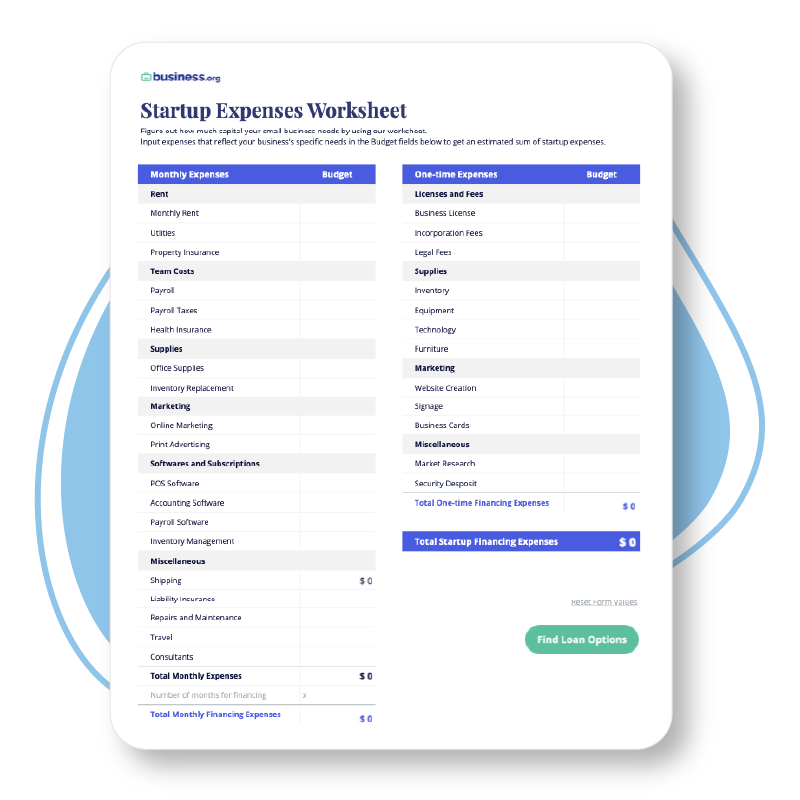We are committed to sharing unbiased reviews. Some of the links on our site are from our partners who compensate us. Read our editorial guidelines and advertising disclosure.
A Step-by-Step Guide on How to Start a Property Management Company
Are you passionate about real estate and have a knack for organization and customer service?
If so, starting a property management company might be the perfect business venture for you. Property management companies are responsible for overseeing the daily operations of rental properties on behalf of property owners, ensuring that everything runs smoothly and tenants are happy.
If you're ready to dive into this unique industry, this in-depth guide on how to start a property management company will walk you through the process.
By signing up I agree to the Terms of Use and Privacy Policy.
How to start a property management company in 6 steps
Starting a property management company shares many similarities with starting any other business. You’ll need to choose a legal structure and create a business plan — essential steps for any budding entrepreneur.
However, there are unique aspects of starting a property management business, too. You’ll need to draft tenant agreements, maintain strong relationships with owners and collect rent payments.
There’s a lot to cover, so let’s get started.
Step 1: Research and plan your property management business
This isn’t the sort of business you can delve into without much real estate management experience or prior knowledge.
To successfully start a property management company, you’ll need a solid understanding of the real estate industry.
Study the local real estate market to identify areas with high rental demand and a potential shortage of property management services.
Explore rental prices, vacancy rates, and tenant preferences to gauge the profit potential of your venture.
Finally, decide what types of properties you want to manage, such as residential, commercial, or vacation rentals.
Define your business model
Determine the type of property management services you want to offer. Will you specialize in a particular niche, such as small office buildings, coworking spaces, or manufactured homes?
Consider whether you'll manage properties on behalf of individual owners, real estate investors or homeowner associations. Some companies even own the properties they manage, and slowly add to their real estate holdings over time.
Create a property management business plan
A comprehensive business plan will guide your company's growth and operations.
Include sections on your target market, marketing strategies, organizational structure, financial projections and growth plans.
SCORE, a nonprofit organization focused on small business growth, offers free business plan templates you can use. We can walk you through writing your business plan.
Step 2: Setting up your property management business
Once you’ve established a clear plan for your property management company and conducted your research, it’s time to lay the groundwork for your new business.
Pick a legal structure
You’ll need to determine the legal entity for your property management company, such as a limited liability company (LLC) or a corporation.
- LLC: An LLC provides you with the flexibility of a partnership or sole proprietorship while offering limited liability protection like a corporation. This protects your personal assets from business debts and liabilities. An LLC also offers simplified management with fewer formalities and less paperwork than a corporation.
- S Corporation: An S corp combines the benefits of limited liability protection with pass-through taxation. This means that business profits and losses pass through to individual shareholders, avoiding double taxation at the corporate level.
- C Corporation: A C corp might be a good fit if you have plans for substantial growth, attracting investors or going public. C corps are separate legal entities and provide limited liability protection. They offer the ability to issue different classes of stock, making it easier to raise capital. However, C corps are subject to corporate income tax. If dividends are distributed to shareholders, they may face individual income tax as well.
To make the best decision for your own property management company, consult with a real estate attorney or business accountant. They can provide guidance based on your specific circumstances and long-term goals.
Figure out your taxes
As a business owner, you’ll need to pay a host of new taxes, including federal taxes, sales taxes and payroll taxes.
Consulting with an accountant is a smart move. A tax professional can advise you on how to structure your property management company to minimize your tax bill and help you file your tax returns.
You’ll also need an employer identification number (EIN), a unique identifier assigned by the Internal Revenue Service. You can apply for an EIN on the IRS website for free.
Get licensed
Before diving in, make sure you have the necessary up-to-date licensing to operate legally in your state.
One of the main licenses to consider is a real estate broker's license. It demonstrates your expertise in areas like insurance, taxes, and contracts. To get a real estate broker’s license, you’ll need to complete specific courses and pass a comprehensive exam.
Some states may also require a property manager’s license. This too requires coursework and an exam.
Step 3: Accounting and financial management
Next, it’s time to set up a bookkeeping and accounting system to monitor cash flow and maintain accurate financial records.
There are many accounting software programs to choose from, including Freshbooks, Zoho and Xero. They all have tools to help you keep track of income and monitor expenses.
It’s also vital to set up a streamlined rent collection process — including online payment options.
On a tight budget? Check out our top picks for the best free accounting software for small businesses.
Research property management software
Investing in property management software and automation tools can help streamline your operations.
Buildium and Yardi are two popular options. Both offer a suite of integrated services including accounting, marketing, and lease execution.
Using these programs can also make renting easier for tenants because it allows them to make payments, sign leases, request support, and manage their accounts online.
Property management software usually offers different pricing tiers, and services can be customized to fit your needs. Buildium, for example, offers three package options, ranging from $52 to $479 a month.
Open a business bank account
You may be required by law to open a separate business bank account for tax purposes, depending on which state you live in. Either way, it’s a good idea to have dedicated accounts in your business’ name. Many banks and credit unions offer business checking and savings accounts.
You may want to consider opening a small business credit card, too. It can help you rack up points and cash back on business expenses, while keeping your personal and business finances separate.
Top banks for small businesses
Data effective 4/20/23. At publishing time, rates, fees, and requirements are current but are subject to change. Offers may not be available in all areas.
Create a pricing structure
Figuring out how much to charge owners is vital to operating a successful property management company.
First, consider the type of fee structure you want to implement. There are several options to choose from.
- Flat fee model: This simple and transparent pricing structure charges a fixed fee per property or unit, regardless of its rental value or size. Flat fees are often appealing to clients because they’re predictable. Ensure that the flat fee adequately covers your costs and allows for a decent profit margin.
- Percentage of rent: Another popular pricing model is charging a percentage of the monthly rent collected from each property. Most property management companies charge anywhere from 8% to 12% of the monthly rent.
- Hybrid model: If you want to offer flexibility and cater to different client needs, consider a hybrid pricing structure. This approach combines elements of both the flat fee and percentage of rent models. For example, you could charge a lower flat fee along with a small percentage of the collected rent.
- Value-based pricing: As your property management company grows and establishes a strong reputation, you may consider adopting a value-based pricing strategy. With this approach, you charge a premium fee based on the unique value you bring to your clients. This model is best suited for companies that offer specialized services or cater to high-end properties.
To figure out how much to charge property owners, pay attention to what other property management companies in your area charge. This helps you benchmark your prices.
You should also consider the type and size of properties you'll manage. A single-family home requires different services and effort than a multifamily apartment building, so adjust your prices accordingly.
Step 4: Create property management contracts and hire staff
There are numerous laws and regulations surrounding real estate and rental properties. Requirements vary by state, but here’s an overview of the essentials.
Lease agreements and contracts
Developing comprehensive lease agreements and management contracts will help protect both your clients' interests and your own.
Consult with a real estate attorney to ensure these documents comply with local laws and regulations governing rental agreements.
Fair housing laws
It’s important to familiarize yourself with the Fair Housing Act to ensure you treat all prospective tenants equally and avoid any form of discrimination.
Be aware of federal, state, and local fair housing laws and stay up to date with any changes.
Tenant screening and eviction procedures
Establish a screening process that adheres to fair housing regulations and effectively assesses prospective tenants. You might decide to conduct credit checks or criminal background checks as part of the process.
Software programs like Rent Spree can help you with the tenant screening and rental application process.
Work with an attorney to develop clear eviction procedures in compliance with local laws so that you follow proper legal protocols when removing tenants who violate their lease agreements.
Hiring staff for maintenance and repairs
Establishing a system for handling maintenance requests promptly is key.
You might be able to handle some basic repairs yourself, assuming you’re as handy with a toolbox as you are with a spreadsheet.
Still, as your property management company grows, you’ll need to develop relationships with trusted contractors and vendors. Build a reliable maintenance crew of plumbers, electricians, septic companies, waste companies, and landscapers.
Negotiate favorable rates so you can resolve maintenance issues in a timely manner.
And make sure to calculate how much revenue you need to hire an employee.
Step 5: Market your property management business and find clients
You’ve got the skills and laid the foundation for a successful property management company.
Now that your business is up and running, it’s time to start finding clients.
But adding new properties to your portfolio is only part of the process. You’ll need to keep and retain them, too.
Create a professional brand
Develop a visually appealing logo, website, and marketing materials to establish credibility and attract potential clients.
You’ll also need to pick a business name for your property management company if you haven’t done so already.
Your secretary of state’s website should have an online database where you can find out if your proposed business name is already taken.
PRO TIP: Need help picking out a name? Here are some tips on how to come up with a business name.
Establish an online presence
A lot of business happens online, so make sure to create a user-friendly website and active social media profiles. (Hint: Wix is a great option for websites.)
Attract more potential clients by following search engine optimization (SEO) best practices and utilize keywords relevant to your services.
You should also advertise your available properties on reputable listing sites like Zillow and Apartments.com. Ensure your listings are detailed and include high-quality photos.
Social media is another great way to connect with potential clients. Check out these ways to engage customers with social media marketing.
Explore local advertising and partnerships
Consider advertising in local newspapers, magazines, and websites frequented by your target audience.
Partner with local real estate agencies, property investment groups, or homeowners' associations to tap into their networks and gain referrals.
Great customer service goes a long way
Word-of-mouth referrals are essential for property management companies, so offer referral incentives to current clients who refer new business to you.
Keep clients informed about their properties by providing regular updates, financial statements, and property performance reports. Proactive communication fosters transparency and shows your dedication.
To keep business flowing in, focus on delivering outstanding customer service. Happy tenants and satisfied property owners are much more likely to recommend your services.
Tenant communication and retention
As a property manager, maintaining communication with tenants is essential. Respond promptly to questions and concerns to foster positive tenant relationships.
Consider implementing tenant retention strategies, such as renewal incentives or discounts on lease renewal fees.
Step 6: Expand your property management company
As your business grows, you may need to hire additional staff, including administrative personnel, maintenance workers, and other property managers.
Implement an efficient hiring process so you can recruit qualified employees without wasting time digging through dead-end resumes.
You should also consider outsourcing certain tasks, such as bookkeeping or marketing, to third-party providers.
Market research and adaptation
To stay at the top, you’ll need to continuously monitor the local real estate market and rental trends.
Regularly evaluate your service offerings and make necessary changes to stay ahead of other property managers.
Stay current in the property management industry
To grow your business, never stop learning.
Attend industry conferences, seminars, and workshops to stay updated on real estate industry trends, best practices and regulatory changes.
Networking with other property managers can also provide valuable insights and keep you ahead of the game.
Consider obtaining professional certifications, such as certified property manager (CPM) or residential management professional (RMP) to enhance your credentials.

Browse hundreds of loan options, custom-tailored to your business and budget needs, from a single, simple platform.
Final thoughts
Knowing how to start a property management company can be challenging, but with the right approach, it can be a profitable and fulfilling business.
By implementing the strategies and tips outlined in this guide, you'll be well on your way to building a successful property management empire.
Rachel Christian is a Certified Educator in Personal Finance and a senior writer at The Penny Hoarder. She focuses on small businesses, retirement, taxes and investing.
Related reading







